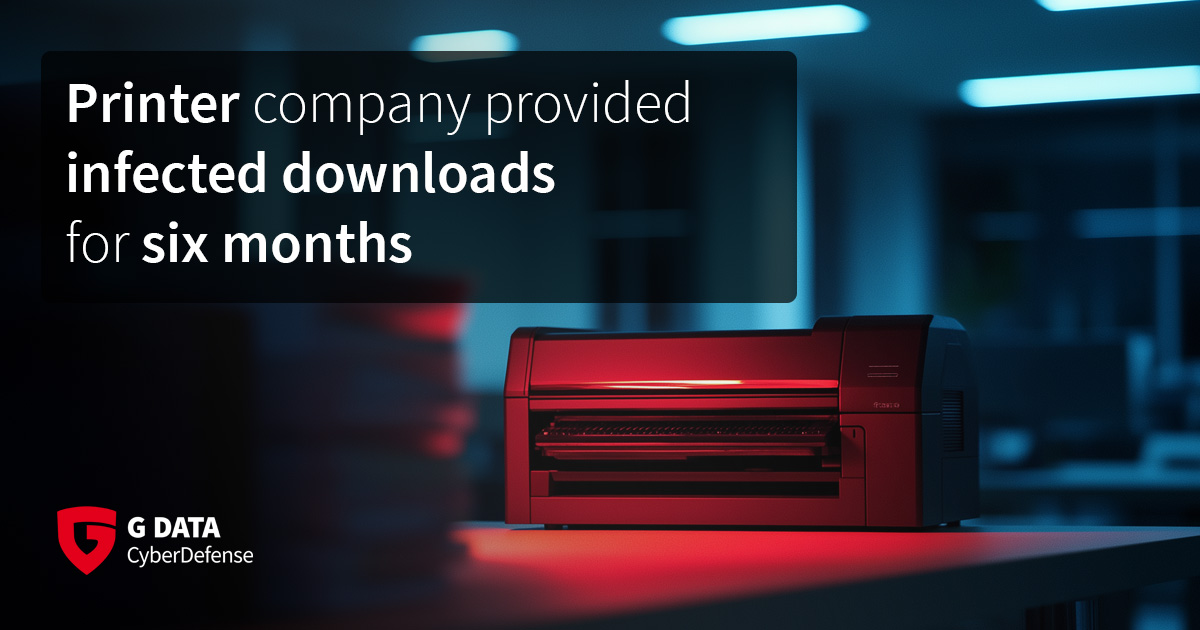This Printer company served you malware for months, called them false positives
-
This post did not contain any content.

Procolored: Printer company serves malware für six months, claims "false positive" warnings
A USB worm, clipbanker virus, and backdoor - all that was in the public "Downloads" section of the website of a printer manufacturer. Read the full story.

(www.gdatasoftware.com)
Wow it’s not HP.
-
This post did not contain any content.

Procolored: Printer company serves malware für six months, claims "false positive" warnings
A USB worm, clipbanker virus, and backdoor - all that was in the public "Downloads" section of the website of a printer manufacturer. Read the full story.

(www.gdatasoftware.com)
The fact they're still trying to blame "Chinese language" after presumably being provided with receipts?
-
Also it’s for a UV printer, not an inkjet or laser printer, with the cheapest option on their website being $1900 and the average being around $6000. So, not a regular printer you would buy off the shelf. It’s still bad of course, but only so many people even could be impacted by it.
Except you don't need to have bought one to be affected by it. Maybe your employer bought one, and infected a computer you use at work.
-
Wow it’s not HP.
In that case it wouldn’t be news.
-
This post did not contain any content.

Procolored: Printer company serves malware für six months, claims "false positive" warnings
A USB worm, clipbanker virus, and backdoor - all that was in the public "Downloads" section of the website of a printer manufacturer. Read the full story.

(www.gdatasoftware.com)
Can you please add the company name in the title? If you want to keep original title, you can do it like this:
This printer company [Procolored]
-
This post did not contain any content.

Procolored: Printer company serves malware für six months, claims "false positive" warnings
A USB worm, clipbanker virus, and backdoor - all that was in the public "Downloads" section of the website of a printer manufacturer. Read the full story.

(www.gdatasoftware.com)
Looks like the printer company did not have antivirus on their systems.
-
This post did not contain any content.

Procolored: Printer company serves malware für six months, claims "false positive" warnings
A USB worm, clipbanker virus, and backdoor - all that was in the public "Downloads" section of the website of a printer manufacturer. Read the full story.

(www.gdatasoftware.com)
Why would anyone use the software? Aren't modern printers plug and play?
-
Why would anyone use the software? Aren't modern printers plug and play?
Plug and auto install drivers and play
-
This post did not contain any content.

Procolored: Printer company serves malware für six months, claims "false positive" warnings
A USB worm, clipbanker virus, and backdoor - all that was in the public "Downloads" section of the website of a printer manufacturer. Read the full story.

(www.gdatasoftware.com)
Good to see there are still viruses in the wild, I was beginning to think those kinda became some ancient forgotten form of art. [I mean proper viruses, not malware in general]
-
Looks like the printer company did not have antivirus on their systems.
It was a false positive.
Edit: I can't believe this needed a /s
-
It was a false positive.
Edit: I can't believe this needed a /s
It was not
-
Also it’s for a UV printer, not an inkjet or laser printer, with the cheapest option on their website being $1900 and the average being around $6000. So, not a regular printer you would buy off the shelf. It’s still bad of course, but only so many people even could be impacted by it.
That's almost worse. Because then you'll be more inclined to trust them.
-
It was not
... c/whoosh?
-
... c/whoosh?
No this is an example where sarcasm and stupidity can't be distinguished via text alone.
-
No this is an example where sarcasm and stupidity can't be distinguished via text alone.
Would have thought it was an obvious play on the headline, but I accept that sheer stupidity does exist.
-
Would have thought it was an obvious play on the headline, but I accept that sheer stupidity does exist.
Yeah unfortunately
-
Except you don't need to have bought one to be affected by it. Maybe your employer bought one, and infected a computer you use at work.
That’s possible, but they aren’t really typical office printers either, it’s for specialized art printing. Again it’s definitely bad, this just isn’t typical office equipment.
-
That's almost worse. Because then you'll be more inclined to trust them.
Yeah, I would expect a printer I paid 6k for to not have malware!
-
Would have thought it was an obvious play on the headline, but I accept that sheer stupidity does exist.
Poe's law:
https://en.m.wikipedia.org/wiki/Poe's_law -
Mobile wikipedia on computers looks nice
-
-
-
Is it feasible and scalable to combine self-replicating automata (after von Neumann) with federated learning and the social web?
Technology 1
1
-
Trump Media & Technology Group, the company owned by the President, said Tuesday that it would raise $2.5 billion to invest in Bitcoin
Technology 1
1
-
-
Xinbi: The $8 Billion Colorado-Incorporated Marketplace for Pig-Butchering Scammers and North Korean Hackers
Technology 1
1
-
-





